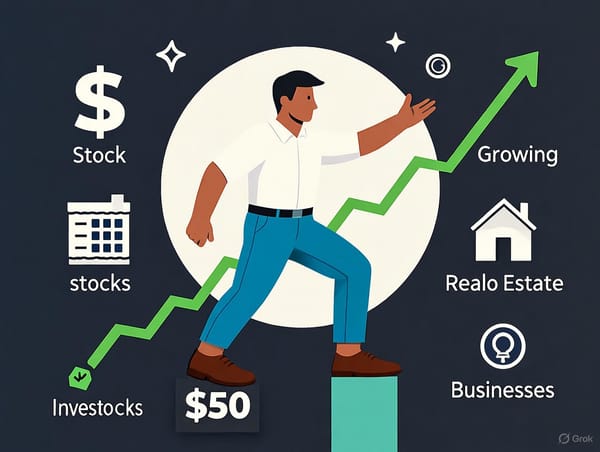Future-Proofing Your Career
To future-proof your career, embrace lifelong learning and build adaptable skills in emerging fields like robotics and sustainability, positioning yourself to thrive in a rapidly evolving job market.

The job market is a moving target, reshaped by technological breakthroughs, societal shifts, and global challenges. What was once a stable career path can become obsolete in a decade—or less. Future-proofing your career isn’t about chasing every shiny new trend; it’s about understanding the forces driving change and positioning yourself to adapt, thrive, and lead in tomorrow’s economy. This article dives into how you can spot emerging fields, like robotics or sustainability, and tailor your expertise to stay ahead of the curve.
Understanding the Forces Shaping the Future
To future-proof your career, you first need to grasp the big-picture trends reshaping industries. Technology, demographics, and environmental pressures are among the most powerful drivers.
Technological Disruption
Artificial intelligence, automation, and quantum computing aren’t just buzzwords—they’re rewriting job descriptions. For example, AI is already streamlining tasks in industries from healthcare to finance, creating demand for professionals who can design, manage, or ethically oversee these systems. Meanwhile, roles that rely on repetitive tasks, like data entry, are shrinking.
Demographic Shifts
Aging populations in many countries are straining healthcare systems and pension funds, while younger generations are prioritizing flexibility and purpose in their work. This creates opportunities in eldercare, mental health, and industries that cater to evolving values, like ethical investing or remote work solutions.
Environmental Imperatives
Climate change is no longer a distant concern—it’s a business reality. Companies face pressure to reduce carbon footprints, driving demand for expertise in renewable energy, circular economies, and sustainable supply chains. Fields like environmental engineering or green architecture are expanding as organizations rethink how they operate.
By keeping an eye on these macro trends, you can anticipate which skills will be in demand and avoid being blindsided by disruption.
Spotting Emerging Fields
Identifying the next big thing requires curiosity and a knack for connecting dots. Emerging fields often arise at the intersection of existing disciplines, fueled by innovation or necessity. Let’s explore two standout examples: robotics and sustainability.
The Rise of Robotics
Robotics is transforming industries from manufacturing to medicine. Collaborative robots, or “cobots,” work alongside humans in factories, while surgical robots enhance precision in operating rooms. The global robotics market is projected to grow significantly, with applications expanding into agriculture, logistics, and even education.
What makes robotics a promising field? It’s not just about building robots—it’s about the ecosystem around them. Programmers, data scientists, and ethicists are needed to develop AI that powers robots. Maintenance technicians keep them running. User experience designers ensure they’re intuitive for humans. If you’re intrigued by robotics, consider specializing in areas like machine learning, human-robot interaction, or even policy to address automation’s societal impacts.
Sustainability as a Career Cornerstone
Sustainability is no longer a niche—it’s a mandate. Businesses, governments, and consumers are prioritizing eco-friendly practices, creating roles that didn’t exist a decade ago. Think carbon accountants, who measure emissions, or urban planners designing climate-resilient cities. The renewable energy sector alone—solar, wind, hydrogen—is booming, with jobs for engineers, project managers, and policy analysts.
Sustainability also intersects with other fields. In fashion, designers are exploring biodegradable materials. In finance, ESG (environmental, social, governance) investing is reshaping portfolios. To break into this space, you might study environmental science, dive into supply chain management, or develop expertise in regulatory frameworks like carbon pricing.
How to Spot Other Emerging Fields
Beyond robotics and sustainability, how do you identify the next wave? Start by following the money—venture capital flows often signal where innovation is headed. Read industry reports from firms like McKinsey or Deloitte for forecasts. Engage with communities on platforms like X, where professionals discuss trends in real time. And don’t ignore your own interests—fields like synthetic biology or space tourism might spark your passion and align with future demand.
Tailoring Your Expertise
Spotting trends is only half the battle. To thrive, you need to build skills that are both relevant and adaptable. Here’s how to position yourself for success.
Embrace Lifelong Learning
The half-life of skills is shrinking—some estimate technical skills become outdated in just a few years. Commit to continuous learning to stay relevant. Online platforms like Coursera, edX, or LinkedIn Learning offer courses in emerging areas, from AI fundamentals to sustainable design. If you’re in a traditional field like accounting, explore how tech, like blockchain, is changing it.
Formal education still matters for some roles, but don’t underestimate micro-credentials. A certification in data analytics or renewable energy systems can signal expertise without a full degree. Stay curious and allocate time each month to explore something new.
Develop Transferable Skills
Hard skills get you hired, but soft skills make you indispensable. Critical thinking, adaptability, and communication are evergreen. For example, a project manager in construction could pivot to renewable energy projects with minimal retraining if they’re skilled at leading teams and solving problems.
Digital literacy is another must. You don’t need to code like a software engineer, but understanding tools like Python, Tableau, or even basic AI platforms can set you apart. Emotional intelligence, too, is critical—especially in fields like robotics, where human-machine collaboration requires empathy and nuance.
Build a Personal Brand
In a crowded market, visibility matters. Share your expertise through blogs, LinkedIn posts, or speaking at industry events. If you’re diving into sustainability, write about innovations in your niche or comment on X about new policies. A strong personal brand showcases your knowledge and makes you a go-to person in your field.
Networking is part of this. Connect with professionals in emerging industries through conferences, webinars, or online forums. Ask questions, offer insights, and build relationships that open doors.
Overcoming Common Pitfalls
Future-proofing isn’t without challenges. It’s easy to feel overwhelmed by choices or fear making the wrong move. Here’s how to navigate common hurdles.
Avoiding Trend-Chasing
Not every trend is worth pursuing. NFTs were hyped a few years ago, but their staying power is questionable. Before committing to a field, research its long-term viability. Does it solve a real problem? Is there growing investment or regulatory support? Robotics and sustainability check these boxes, but always dig deeper.
Managing Upfront Costs
Switching fields can feel risky, especially if it requires time or money. Start small—take a free course or volunteer for projects at your current job that align with your target field. If you’re eyeing robotics, tinker with Arduino kits or join open-source projects. Gradual steps reduce risk while building confidence.
Staying Resilient
Change is uncomfortable, and setbacks are inevitable. Maybe a course feels too hard, or a job application gets rejected. Reframe these as learning opportunities. Resilience—paired with a clear goal—keeps you moving forward.
Creating Your Action Plan
Future-proofing your career is a journey, not a sprint. Here’s a roadmap to get started:
- Assess Your Starting Point: Reflect on your current skills, interests, and values. What excites you about fields like robotics or sustainability?
- Research Trends: Spend an hour each week reading reports, following thought leaders, or scanning X for discussions on emerging industries.
- Set Learning Goals: Identify one or two skills to develop in the next six months. Sign up for a course or find a mentor.
- Experiment: Take on a side project or freelance gig to test the waters. If you’re curious about sustainability, volunteer with a local environmental group.
- Track Progress: Every few months, review what you’ve learned and adjust your plan. Are you closer to your goal? What’s next?
The Long Game
Future-proofing your career isn’t about predicting the future with certainty—it’s about preparing for uncertainty with confidence. By understanding macro trends, spotting fields like robotics or sustainability, and building adaptable skills, you can position yourself not just to survive but to shape the job market of tomorrow. Stay curious, stay resilient, and keep learning. The curve is always shifting, but with the right mindset, you’ll always be ahead of it.





